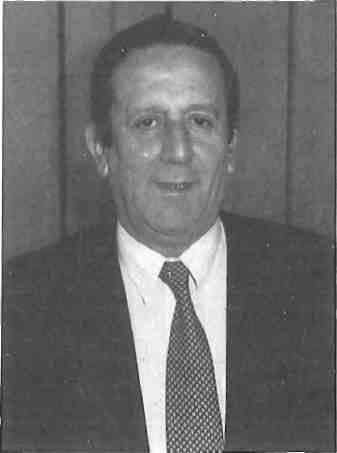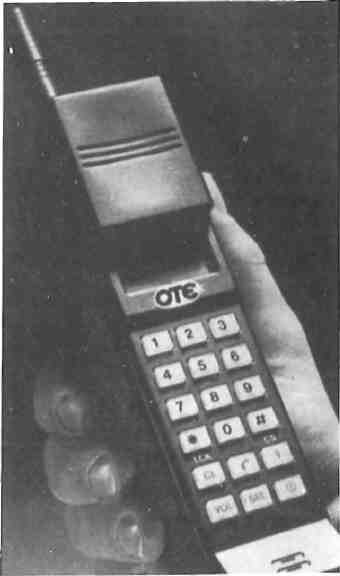
With nearly 30,000 employees throughout the country, OTE (Hellenic Telecommunications Organization) is a lumbering giant plagued with consumer complaints, political scandals and accusations of phone tapping. To head such an organization can be no picnic and although the OTE General Director Professor Kyriakos Kioulafas is an affable man, his air of slight harassment is with him when in his office high in OTE towers in Maroussi.
While OTE in 1988 showed debts of over half its total assets, it managed to show a return of 10.99 percent, and, according to ICAP, to be the most profitable organization of that year, with profits of 19.5 billion. Why, one wonders, should we have such a bad service?
In a recent exclusive interview, Mr Kioulafas, clearly outlined what OTE is planning, what it is doing and what kind of investments are being made in the telecommunications field. Prior to our interview, Alternate Minister of Merchant Marine Apostolis Pavlidis had announced at a press conference that the upgrading of telecommunications would be the first step towards transforming Piraeus as an international marine centre. He announced that meetings with Professor Kioulafas and Undersecretary of Transport and Communications Apostolos Kratsas would follow.
I asked Professor Kioulafas about the outcome of this meeting.
“I would characterize our meeting as positive. We have decided to set up this telecommunications park, or centre, in the Piraeus area in order to make it available to shipowners. We have started working on that and the first report to the minister will be submitted within 20 days. There is a team working on it now. They have already had their first meeting and we have agreed they comply with my order to submit their results within that time limit.”
Earlier, I had spoken to Finance Minister John Paleokrassas regarding OTE and telecommunications, he had stated that, in his opinion, not enough investment was being made in this sector. OTE began a four to five billion dollar program to digitalize in October 1989. Much of the work went to a German/Swedish/Greek consortium Siemens / Ericsson / Intercom), but large parts of the program will now be sub-contracted directly by OTE or indirectly by the consortium to other foreign firms. According to reliable sources, a tender for bids for a turn-key earth station (Eutesat) is expected to be reissued after a cancellation earlier this year. The estimated budget is 10 million dollars, but it could reach as much as 50 million dollars with attachments and additional systems.
Professor Kioulafas agreed the present sum was an inadequate investment and that he planned to buy 720,000 digital lines in the near future. “When I buy digital lines, Ϊ introduce new technology into OTE. That is the only way to overcome problems. We will begin implementation of this program – the first digital centres – in October 1990,” he said, addingll We will start putting in a map at the beginning of next year, which means that next spring we will be in a position to say we are doing better. Crossed lines are due to overloading, lack of maintenance, old machinery and equipment. There was no investment during the last ten years in telecommunications.

This summer, better services were set up by OTE to accommodate tourists’ demand. Over 200 new services were created throughout the country, with better telephone communication services on weekends (always notoriously inadequate). In reply to the question whether he intended to extend these services year round, he stated, “There is a question of money. The whole cost of this exercise was 200,000 million drachmas during this summer period, at a time when we were investing all we can in new technology. But we must give some services on weekends. We have more than seven million tourists here, so it means we lose more than 500 million dollars per year due to the incapability of OTE to support our tourists with adequate telecommunications services.”
Nuisance calls are another problem in need of solution. In the United-Kingdom, the subscriber complains to the GPO (British OTE) and for three weeks thereafter all calls are monitored – incoming calls, anyway.
Regretfully, Professor Kioulafas said the problem is still to be addressed. “We haven’t managed to face it so far. We have a study going on to research how to lessen the problems along the lines of the UK.”
Rumors of deregulation and privatization of certain OTE services abound and are expected to be implemented at some point in the near future. The impetus for the rapid changes stem from external pressures by the EC to liberalize telecommunications for the 1992 open market rather than from any specific program, although the present government is considering such a move.
Professor Kioulafas has been in his present position for a year. As a result, he has had time to ascertain where the problems lie and how to deal with them. Born in Samos in 1940, he studied economics and gained a law degree at the University of Athens in 1963. A two-year course in physics at the university followed. From 1972 to 1976 he did post-graduate studies at the Mathematics Department of Heriott-Watt University in Edinburgh. He completed market research and business studies.
His research paper “Operational Research Techniques and Marketing Strategies Applied to the Aggregate Production Planning Problem” was submitted in 1977. Four years later he was invited in the capacity of special scientist to teach in the Technical Economics Program at the University of Athens. In a post recently given out to political patronage, it is a relief to see a figure with a reliable and esteemed background.
“We have a program of investment amounting to about 400 million drachmas over the next three years. We hope we will be able to apply this program which includes new services such as mobile phones, telefax, video-conference and this sort of things. We are already near to applying some of it.” Mr Kioulafas is confident that the problems will be ironed out over a period of time. He asks for patience, for these things cannot be done overnight. “There are some inflexibilities, but the government believes it can help us in facing the problems we have. It is, after all, a public civil service, but we can be made more autonomous than we are.”
On the matter of the 1996 Olympics, OTE had published a detailed booklet on how it would have coped with the enormous task of supplying necessary facilities and telecommunications coverage for the event. The communications infrastructure for the Mediterranean Games in Athens in 1991 has already been worked out and there will be a practice run of sorts.
Although OTE itself has been in existence for only 40 years, telecommunications in Greece have been around in some form or another since 1859 when the first telegraph service between Athens and Piraeus was set up. It gradually developed over the years until 1949 when the networks were banded together under the present single umbrella. In 1957 the first telex service was introduced and today the latest technology is being applied or is in the process of it even if the situation seems otherwise with the amount of wrong numbers and crossed lines we encounter.
Prompted by keen staff members who have contributed tirelessly and selflessly, OTE is in the process of gathering material for a Museum of Hellenic Telecommunications displaying antique equipment and telephones plus material showing the history of talking over the wires in Greece. This may seem like sheer bravado when so much of the present equipment is still historical, but the day seems not far off when callers will regret (occasionally) the unexpected, gregarious, user-friendly days of crossed wires and wrong numbers.







